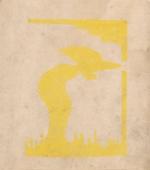Kunstkritiek
Erich Wichmann
Rijksmuseum
Amsterdam, NL
1916
As a disillusioned artist, Wichmann sought an alternative outlet for his creative impulses. In the aftermath of World War I, a prevailing sense of disillusionment permeated the artistic community, with many young artists harboring a deep-seated aversion toward society and the bourgeoisie. This sentiment found expression through committed art and activist endeavors, rooted in the belief that existing social structures needed to be dismantled to pave the way for a new worldview and a more humane society. The resulting anti-bourgeois fervor often manifested as a protest against the societal norms of the time, sometimes taking on an anti-democratic stance. This period of protest was characterized by its lack of structure and its diverse forms of expression, mirroring Wichmann's own multifaceted nature.
Type
89 × 78 mm
